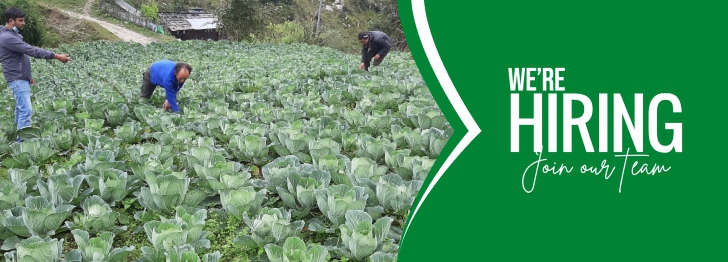


The new five-year Feed the Future Nepal USAID Agricultural Transformation (“USAID Agricultural Transformation”) aims to catalyze transformation of Nepal’s agricultural sector required for long term inclusive economic growth. USAID Agricultural Transformation is implemented by Winrock International (prime) in collaboration with Center for Environmental and Agricultural Policy Research, Extension and Development (CEAPRED), Forum for Rural Welfare and Agricultural Reform for Development (FORWARD), CrossBoundary, Banyan Global, and the Institute for Integrated Development Studies (IIDS). USAID Agricultural Transformation’s working area will include 26 districts across six provinces, with the goal to reach more than 500,000 farmers.
Building on successful Feed the Future (FTF) investments in Nepal, USAID Agricultural Transformation will apply a refined evidence-based market systems development approach that empowers Nepali private and public actors to identify, design, implement, and own solutions that address root causes of market inefficiencies across five target value chains (fine rice, industrial maize, lentils, high-value vegetables, and goat) through four interrelated objectives:
Objective 1: Agricultural productivity, competitiveness, and diversification increased
Objective 2: Enabling environment for private sector investment in agriculture and equitable access to market systems improved
Objective 3: Climate and economic resilience of women, youth, and marginalized communities enhanced
Objective 4: Capacity of national agricultural research institutions and extension systems strengthened.
The new five-year Feed the Future Nepal USAID Agricultural Transformation (“USAID Agricultural Transformation”) aims to catalyze transformation of Nepal’s agricultural sector required for long term inclusive economic growth. USAID Agricultural Transformation is implemented by Winrock International (prime) in collaboration with Center for Environmental and Agricultural Policy Research, Extension and Development (CEAPRED), Forum for Rural Welfare and Agricultural Reform for Development (FORWARD), CrossBoundary, Banyan Global, …
Views: 3716 | This job is expired 5 months, 3 weeks ago
Position: Agricultural Competitiveness and Diversification Director
Location: Kathmandu (frequent domestic travel required)
Reports To: Deputy Chief of Party (Technical)
Background:
The new five-year Feed the Future Nepal USAID Agricultural Transformation (“USAID Agricultural Transformation”) aims to catalyze the transformation of Nepal’s agricultural sector required for long-term inclusive economic growth. USAID Agricultural Transformation is implemented by Winrock International in collaboration with Center for Environmental and Agricultural Policy Research, Extension and Development (CEAPRED), Forum for Rural Welfare and Agricultural Reform for Development (FORWARD), CrossBoundary, Banyan Global, and the Institute for Integrated Development Studies (IIDS). USAID Agricultural Transformation’s working area will include 26 districts across six provinces, with the goal to reach more than 500,000 farming households. Building on successful Feed the Future (FTF) investments in Nepal, USAID Agricultural Transformation will apply a refined evidence-based market systems development approach that empowers Nepali private and public actors to identify, design, implement, and own solutions that address root causes of market inefficiencies across five target value chains (fine rice, industrial maize, lentils, high value-vegetables, and goat) through four interrelated objectives:
Objective 1: Agricultural productivity, competitiveness, and diversification increased
Objective 2: Enabling environment for private sector investment in agriculture and equitable access to market systems improved
Objective 3: Climate and economic resilience of women, youth, and marginalized communities enhanced
Objective 4: Capacity of national agricultural research institutions and extension systems strengthened.
USAID Agricultural Transformation will place women, youth, and marginalized populations at the center of intervention design to strengthen their economic participation and address underlying constraints to accessing productive resources, markets, and information. Strategic facilitation pathways will catalyze new investment in inclusive business models, facilitate adoption of climate smart practices, technologies, and services tailored to the diverse needs of users, and strengthen the Government of Nepal (GON) at all three tiers.
Position Description:
This position is responsible for implementing a comprehensive and sustainable agriculture approach that increases smallholder farmer incomes, productivity, competitiveness, and diversification with increased resilience. This position will oversee and provide guidance to activities and consortium partners under Objective 1 using a market systems development approach while engaging a variety of value chain actors (cooperatives, agrovets, local service providers, aggregators, millers, extension workers etc.) in service delivery and capacity strengthening of farmer groups. This position will work closely with the Senior Business and Market Systems Director and Managers in supporting activities focused on:
This position will be responsible for supporting a holistic (project-wide) analysis of barriers and identifying strategic opportunities for farmers to access higher value markets; receive improved agricultural inputs (including bundling of inputs with other key services, such as insurance); and adopt improved post-production technologies to increase competitiveness. Simultaneously, the position will collaborate closely with other USAID Agricultural Transformation objectives to provide technical input on agricultural policy reform (especially for research and extension); liaise with and provide technical guidance to private sector partnership and other support mechanisms to facilitate technical capacity strengthening measures; and improve access to finance.
Essential Responsibilities:
Qualifications and Requirements:
Education:Bachelor’s degree or equivalent experience required (preferably in agriculture). Master’s degree in related field (agri-business or agri-economics) preferred.
Required Experience & Skills:
Language: Fluent Nepali is required. Fluent/Advanced English, including excellent report writing and English speaking skills, with the ability to deliver high-quality reports/technical documents is required.?
Diversity, Equity, Inculsion and Accessability (DEIA):
We seek to cultivate an environment where all candidates relish equal employment opportunities devoid of discrimination, misconduct, fraud, and abuse. Our commitment to Diversity, Equity, Inclusion, and Accessibility (DEIA) and Localization guides our practices not just in hiring, but also in staff retention, growth, and policy implementation. This commitment signifies that we value diversity in all its forms including age, race, ethnicity, religion, gender, sexual orientation, disability status, and cultural background. We welcome and encourage applications from individuals of all backgrounds, experiences, and perspectives, recognizing the rich tapestry of the communities in which we live and work.
We highly encourage women & people from marginalized communities to apply.
Disclaimer:
Only shortlisted candidates will be contacted for further selection process. The organization reserves the right to reject any/all applications without assigning any reason whatsoever. Canvassing at any stage of the process shall lead to automatic disqualification of the applicant.
This job has expired.









